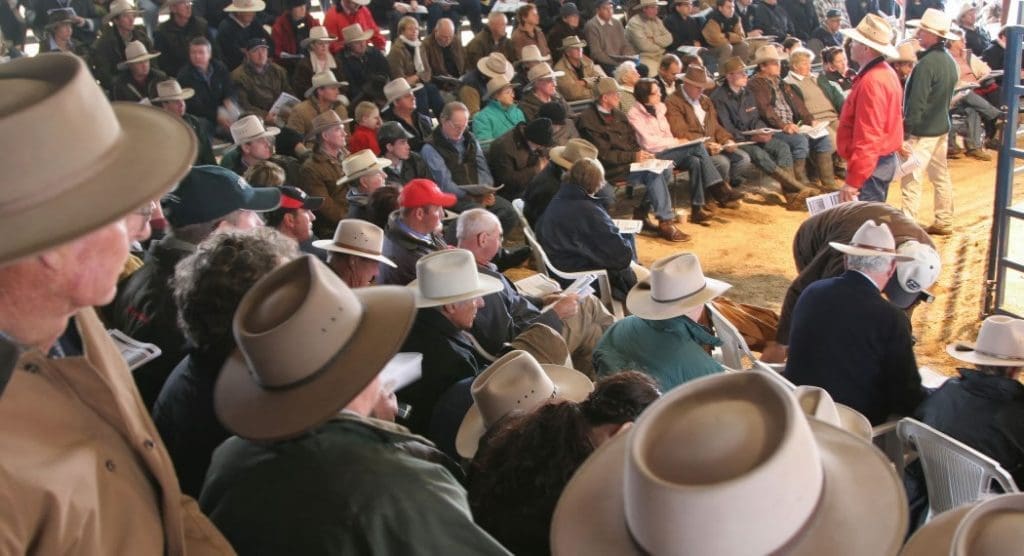
Annual sale day at Palgrove Charolais
WHILE Breedplan is a compelling science used by many to produce better seedstock, there is a clear divide evident in uptake between breeds in northern and southern parts of the continent.
Breedplan adoption is much more widespread in the British and European seedstock herds that predominate in southern Australia, than it is in the bos Indicus influenced breeds that dominate northern Australia.
Objective measurement is well accepted in Angus, where 95 percent of the calves registered are Breedplan-recorded. So entrenched is the system that there is little point becoming a bull breeder/seller unless the calves are registered, performance-recorded and carry Estimated Breeding Values.
The evidence is there to support that theory. Last year 8103 Angus bulls sold across Australia averaged $6023 at auction. With the 2016 Angus sales all but complete, estimates are that about the same number will average more than $7000 this year. Close to 100pc of the Angus bulls that sell at auction carry EBVs.
Two weeks ago Millah Murrah Angus endorsed the Breedplan argument by averaging $16,300 for 109 EBV-carrying bulls with the sale topper at $85,000 in the top 1pc of the breed for several traits.
Then this week, the 158 bulls sold at David and Prue Bondfields‘ Palgrove Charolais and Ultrablack sale averaged $10,848, with all the bulls on Breedplan including the Ultrablacks (an Angus-Brangus composite with no more than 25pc bos Indicus) that generate EBVs through the Angus Society’s Multi Breed Register (MBR).
“A big percentage of our bull buyers look for Breedplan figures,” says David Bondfield, who sells 250 to 300 bulls a year at auction and another 500 to 600 out of the paddock.
The Palgrove Ultrablacks and Charolais were neck-and-neck in averages last year. This year the 44 Ultra Blacks averaged $11,330 and the 114 Charolais, $10,662.
Ross Thompson of Millah Murrah and David Bondfield, two of the sharpest operators in the seedstock business these days, are both quick to point out that Breedplan is an aid to selection while fertility, growth and weight and carcase merit along with structural soundness and common sense are all part of that almost magical mix that produces efficiency and profit.
But hang on, what about the Yarrawonga-Waco Santa Gertrudis sale at Wullumbilla in southern Queensland last week, where 157 bulls averaged $11,443, up more than $1000 on last year’s average. Bulls sold to $75,000 and five topped the $40,000 mark. This was the 57th sale for the Bassingthwaighte family. The studs are now run by brothers Andrew and David and their families.
Step back a month and the brothers had a team of 35 magnificent cherry reds at the Brisbane Ekka taking out the junior bull and female championships as well as the senior and grand champion female award.
In addition they took out championships in Brisbane’s commercial steer and carcase competitions.
And all this stud and commercial success, with not a Breedplan figure in sight.
The $75,000 sale topper strode into the ring carrying a second placed ribbon from Brisbane, a smart pedigree, natural polledness, and real-time measurements (23 mths old; 928kg; 1.26 DWG; 39cm scrotal circumference; 136 sq cm EMA). He is now looking at a new home at Michael Thompson’s Mundah Reds stud in Western Australia.
“Don’t believe in it,” was Andrew Bassingthwaighte’s response to Beef Central’s question about Breedplan.
Yarrawonga-Waco is Australia’s largest Santa Gertrudis sale and will get even bigger according to the owners. Next year the sale will offer 200 bulls, Mr Bassingthwaighte predicts, to “get the average down for clients.”
Last year the sale had strong stud support. This year commercial buyers dominated, paying in the $5000-$6000 range while last year they were paying $3000-$4000.
Next week:
We talk to industry veteran Paul Williams who heads up Tropical Beef Technology Services (SBTS) providing technical services to members of participating breed societies, and also Andrew Byrne, the Angus Australia’s Breed development & Extension Manager and others about the effect of Breedplan in the beef populations they service.
Yearling bulls average $8180
In what could be the best-ever average for an entire catalogue of a decent number of true yearling bulls, 75 yearlings sold in a 100pc clearance at the Steele family’s Ben Nevis Angus sale in central New South Wales last week for an average $8180 and a top of $26,000. What would be the cost of keeping these bulls around to sell in 12 months time? That’s a topic to be explored in a future column.
Another sale of note last week was Central Queensland Brangus where 94 out of 94 bulls sold to a top of $34,000 to average $8723.
